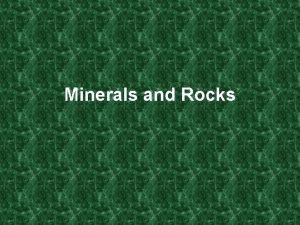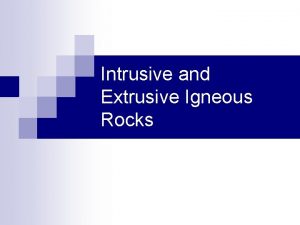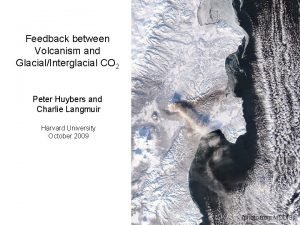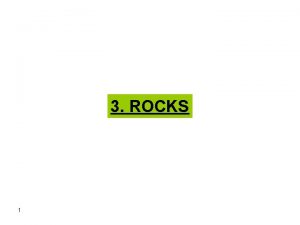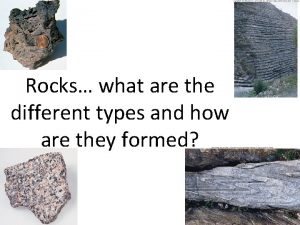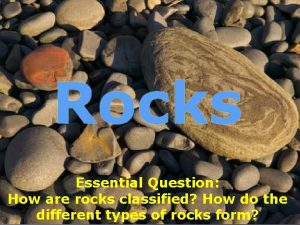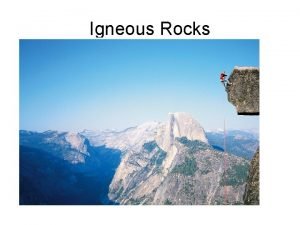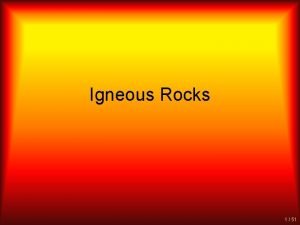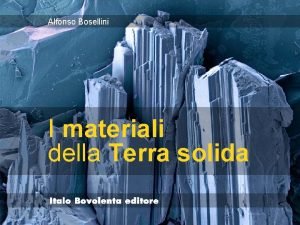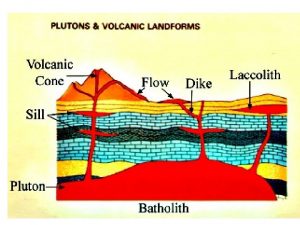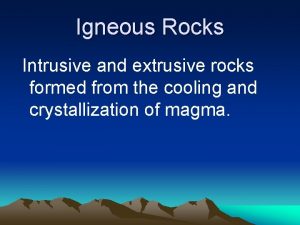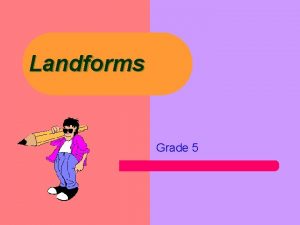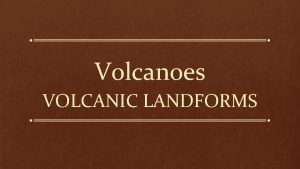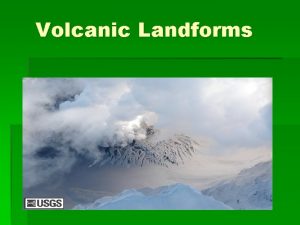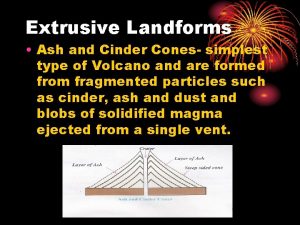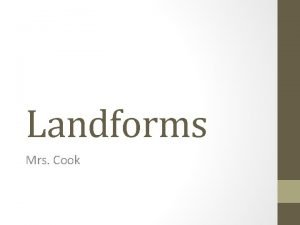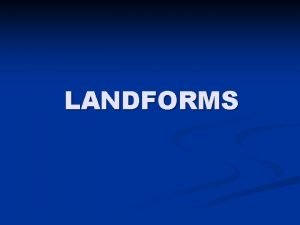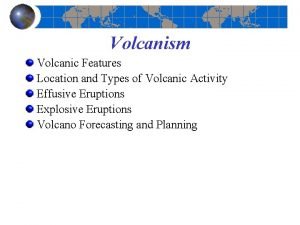INTRUSIVE AND EXTRUSIVE VOLCANIC FEATURES Volcanic Landforms Volcanic





















- Slides: 21

INTRUSIVE AND EXTRUSIVE VOLCANIC FEATURES

Volcanic Landforms • Volcanic landforms are divided into: extrusive and intrusive landforms • based on weather magma cools within the crust or above the crust.

Extrusive Landforms • Extrusive landforms are formed from material thrown out during volcanic activity: • Volcanoes • Craters, calderas, lava domes and lava plateaus, columnar jointing • Mid-Ocean Ridges

Craters • Funnel-shaped pit at the top of a volcanic vent • Formed when material is blown out of the volcano by explosions • Becomes wider by weathering and erosion

Calderas form when a volcanic cone collapses or by discharge of large amounts of magma • Eg. Santorini

Lava Domes • A lava dome is a roughly circular mound-shaped protrusion resulting from the slow extrusion of viscous lava from a volcano.

Lava Flows

Columnar Jointing

The Giant's Causeway is an area of about 40, 000 interlocking basalt columns, the result of an ancient volcanic fissure eruption.

Giant’s Causeway, Northern Ireland

Lava Tubes • Natural conduit formed by flowing lava which moves beneath the hardened surface of a lava flow.

Rift Zone • A set of linear cracks in a volcano. • Rift volcanoes form when magma rises into the gap between diverging plates. • Rift zones areas where the volcano is rifting or splitting apart. .

Intrusive Landforms (Below the crust) • When magma is forced to the surface only a small amount of the mass actually reaches that level. • Most of the magma is intruded into the crust where it solidifies into a range of features. • These are often exposed at the surface by later erosion. • https: //www. youtube. com/watch? v=Nboq 5 zs. Lx. FE

Intrusive Features: Plutons • Pluton is a body of intrusive rock formed from magma that cooled slowly below the surface. • Plutons include batholiths, stocks, dikes, sills, laccoliths, lopoliths, and other igneous formations.

Intrusive and Extrusive Igneous Features 1. Intrusive features = parts of volcanic activity found inside the earth Plutons = Intrusive igneous rocks of any size. Formed inside the earth.

Batholiths • Batholiths are Plutons that have been exposed on the surface through uplift and erosion. • Large (>100 km 2) • Batholiths are often dome-shaped and exposed by later erosion.

• Stocks (Smaller than batholith: <10 km 2)


Sills and Dikes • Sills and Dikes are bodies of magma that intrude into a fracture. • Sills follow bedding planes (horizontal), whereas dikes cross-cut beds (vertical).

Sills and Dikes

Activity • Melting Temperature of Rocks Graphing Exercise
 Luster streak
Luster streak Igneous rocks
Igneous rocks Intrusive vs extrusive igneous rocks
Intrusive vs extrusive igneous rocks Extrusive igneous rocks
Extrusive igneous rocks Pumice extrusive or intrusive
Pumice extrusive or intrusive Intrusive igneous rocks
Intrusive igneous rocks How is igneous rock classified
How is igneous rock classified Is obsidian intrusive or extrusive
Is obsidian intrusive or extrusive Rock is mixture of
Rock is mixture of Volcanic features
Volcanic features Felsic composition
Felsic composition Mafic extrusive igneous rock examples
Mafic extrusive igneous rock examples Extrusive igneous rocks example
Extrusive igneous rocks example Sedimentary deposition
Sedimentary deposition Linking and intrusive r
Linking and intrusive r Non-banded grains
Non-banded grains Igneous rock
Igneous rock How is igneous rock formed
How is igneous rock formed Intrusive list
Intrusive list Rocce intrusive ed effusive
Rocce intrusive ed effusive Non-intrusive pig detection
Non-intrusive pig detection Intrusive advising
Intrusive advising
